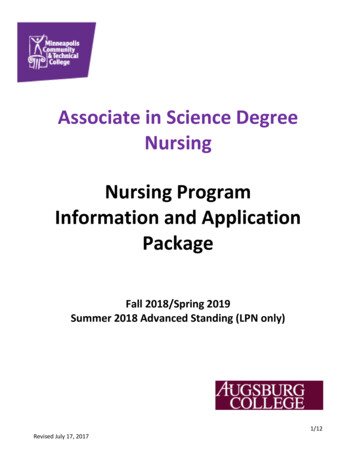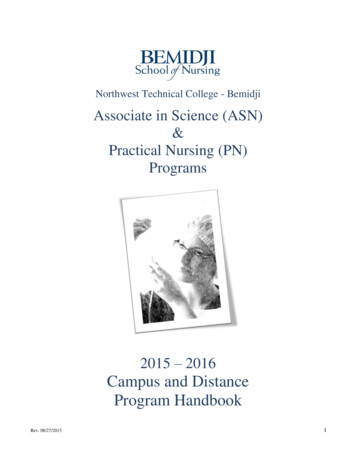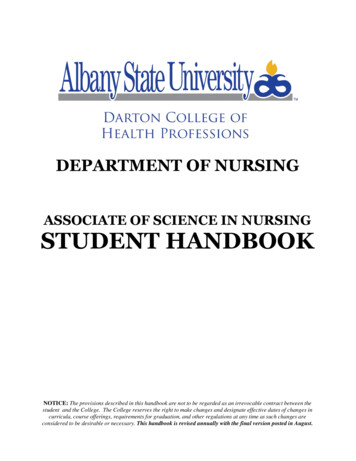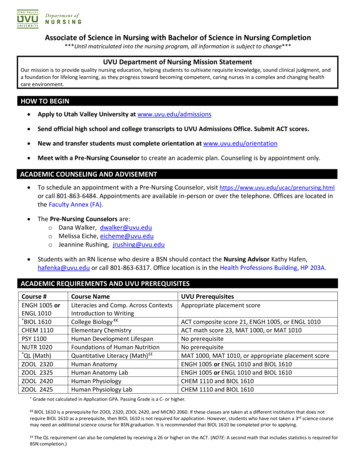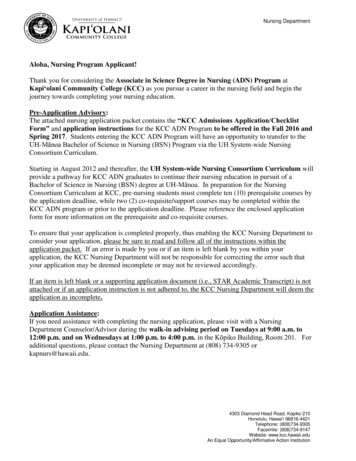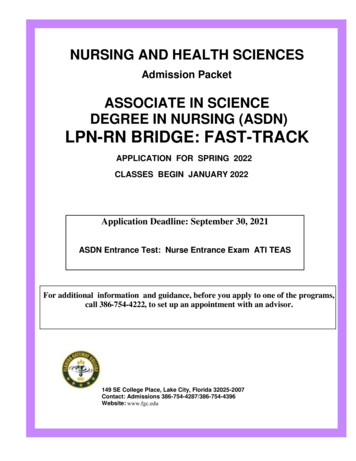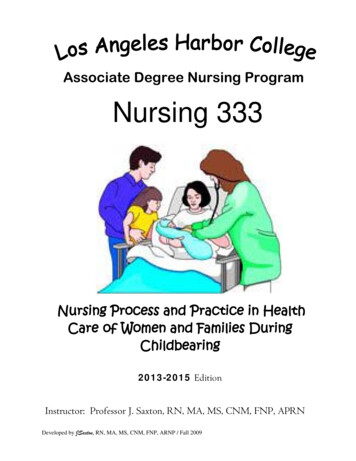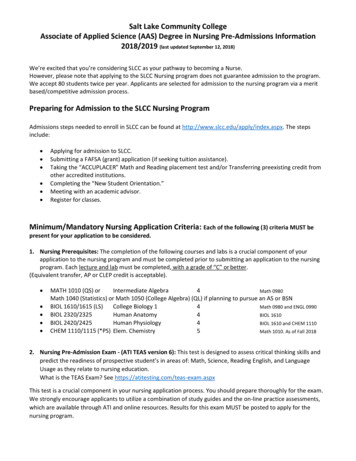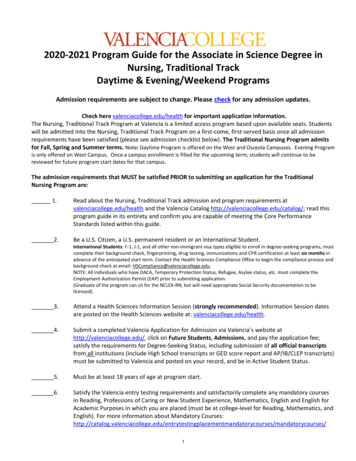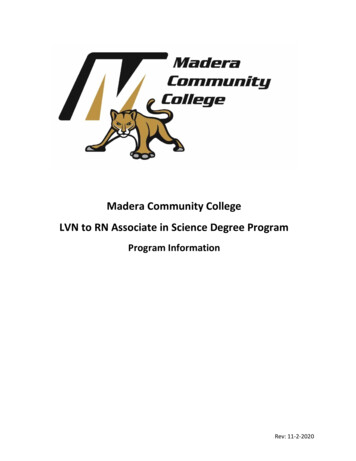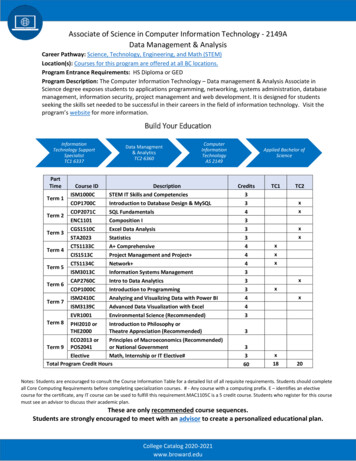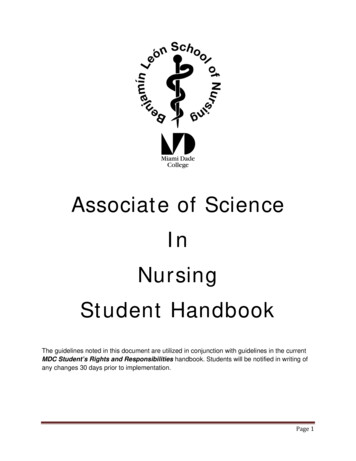
Transcription
Associate of ScienceInNursingStudent HandbookThe guidelines noted in this document are utilized in conjunction with guidelines in the currentMDC Student’s Rights and Responsibilities handbook. Students will be notified in writing ofany changes 30 days prior to implementation.Page 1
MISSIONThe Mission of the School of Nursing is to provide our diverse student population with an excellentmulticultural education that prepares them to skillfully practice nursing in a global society with anemphasis on lifelong learning.VISION/VALUESThe Vision of Miami Dade College School of nursing is to be a school of excellence, renowned for itsValues:An environment that enhances students learning and professional development, empoweredthought innovation, state of the art technologies, teaching excellence and support programs that equipeach learner with knowledge, skills and values to succeed. The School of Nursing assists students todevelop life-long strategies that promote professional nursing responsibilities and global citizenship.A culture of inquiry and evidence that is characterized by the commitment of faculty, staff and studentsto accountability for learning excellence through scientific inquiry base on the nursing process, evidencebased practice, technology, interdisciplinary experience and community partnerships.An exceptional work environment that makes MDC’s school of Nursing the “employer of choice” for anexemplary, diverse nursing faculty workforce, who benefits from extensive faculty development andeducational opportunities, who engage in a true shared governance model, and who utilize state of the arttechnology while teaching, contributing to an exceptional quality learning environment.Quality community partnerships with healthcare agencies in Miami Dade County to meet thecommunity needs by educating culturally-competent nurses who can provide high quality healthcare andeducation to a multicultural society.A commitment to cultural initiatives that allow students to develop an appreciation for the diversity ofthe individual in our global society, resulting in the delivery of holistic, culturally sensitive nursing care.Sustainability practices that distinguish Miami Dade School of Nursing as leading innovator ineducating our students as contributors to a healthy environment, and an understanding of the impact ofour changing environment on the health of each individual.Resource development and operational efficiencies that ensure effective support for the School’slong- term efforts to provide an innovative and exemplary learning environment through the use oftechnology, research, and ongoing process evaluation.Global awareness of health care issues that impact the curriculum and provide an internationalperspective on health.Page 2
Dear Students:Congratulations! Welcome to Miami Dade College (MDC), School of Nursing. You havemade the ultimate lifelong learning decision by entering one of the most trustedprofessions in the world- Nursing!We are honored that you have chosen MDC- School of Nursing to begin your nursingcareer. We hope your educational experiences and journey will be exciting andsuccessful. The faculty, staff and leadership team in the School of Nursing arecommitted to preparing you for a career in nursing, which offers meaningful rewardsderived from providing service to others. Healthcare is ever changing, therefore, aspatient acuity increases and the populations become increasingly diverse, nurses will bechallenged to respond with greater knowledge, technological proficiency, critical thinkingskills, and competence to provide safe and effective patient-centered nursing care. Theconceptual framework your program focuses on is the continuum of novice to expert,culturally competent care, and safe ethical practice.We, in the School of Nursing, are looking forward to having you and eager to assist youin exploring creative, innovative, and transformative ways for you to become acompetent, safe practitioner, as you enter the professional world of service. Pleaseremember we are here for you as you strive for excellence and success in your nursingcareer!DeanChairpersonsFacultyMiami Dade CollegeSchool of NursingPage 3
Table of ContentsItemSection One: Administrative GuidelinesPage Number5Statement of Expectations5Miami Dade College Learning Outcomes5School of Nursing Student learning Outcomes (Terminal Objectives)6Nursing Program Descriptions6-7Associate of Science in Nursing Program Philosophy7-8Associate of Science in Nursing Program Conceptual Framework8Associate of Science in Nursing Program Definitions of Core Components8-9Associate of Science in Nursing Curriculum by Program10Associate of Science in Nursing Program Paradigm11Section Two:Attendance11Section Three:Assignments and Tests11Section Four:Classroom Testing Procedures12-13Section Five:Test Review and Re-Test Policy14Section Six:Grading and Course Completion14Section Seven:Program Progression and Course Repetition15Section Eight:Student Exception Committee16-17Section Nine:External Transfer18Section Ten:Dress Code/Required Equipment18-19Section Eleven:Advisement, Counseling and Tutorials20Section Twelve:Chain-of-Command20Section Thirteen:Conduct20-21Section Fourteen:Disciplinary Process22Section Fifteen:Required Program Documentation22-23Section Sixteen:Exposure Procedure23Section Seventeen: Clinical Pre-Assignments/Rotations23-24Section Eighteen:Chemically Impaired Nursing Student24-25Section Nineteen:Student Affective Behaviors25-27Section Twenty:Code of Academic and Clinical Conduct27-28Section Twenty-one: Professional Behaviors28Section Twenty-two: School of Nursing Student Agreement29Page 4
Student Signature Page27Section One: Administrative GuidelinesIntroduction: Statement of ExpectationsAs indicated in the MDC Students’ Rights and Responsibilities Handbook, Miami Dade College andthe School of Nursing takes great pride in offering a high quality and challenging learning environmentthat will expose you to a myriad of opportunities for discovery and growth. Students can expect:a.b.c.d.e.Excellence in teachingEncouragement of innovation and creativityA free exchange of ideasRespect for cultural diversityA comprehensive array of services to maximize your academic successAs a student, you play a central role in fostering and maintaining a quality environment for yourself andothers. Consequently, Students are expected to:1.2.3.4.5.6.7.8.Attend classes regularly and on time.Succeed and do well in your classes.Strive for personal excellence.Treat others with courtesy and respect.Contribute to the marketplace of ideas at the College.Demonstrate personal and academic integrity in your dealings with others.Make a positive contribution to the multicultural, multiracial environment at the College.Share responsibility for maintaining the integrity of the physical surroundings.To assist students enrolled in any of the Nursing options, sections of the School of Nursing StudentHandbook are linked to specific portions of the Statement of Expectations (Statement of Expectations a-eand/or Statement of Expectations 1-8). Students enrolled in any of the PRN and/or NUR courses areexpected to abide by the “Statement of Expectations” indicated in the MDC Students’ Rights andResponsibilities Handbook.Miami Dade College Learning OutcomesMiami Dade College has adopted the Learning Outcomes listed below. Upon completion of a program ofstudy at the Medical Center Campus, graduates from Miami Dade College should emulate theseoutcomes.1.2.3.4.5.6.7.8.Communicate effectively using listening, speaking, reading and writing skills.Use quantitative analytical skills to evaluate and process numerical data.Solve problem using critical and creative thinking and scientific reasoning.Formulate strategies to locate, evaluate, and apply information.Demonstrate knowledge of diverse cultures, including global and historical perspectives.Create strategies that can be used to fulfill personal, civic, and social responsibilities.Demonstrate knowledge of ethical thinking and its application to issues in society.Use computer and emerging technologies effectively.Page 5
9.10.Demonstrate an appreciation for aesthetics and creative activities.Describe how natural systems function and recognize the impact of humans on the environment.Through a collaborative effort, the School of Nursing has identified which of the ten outcomes correlatewith each nursing course. The specific outcomes will be identified in the course syllabi with information onthe intentional activities utilized to meet the outcome and the manner of authentic assessment employed.School of Nursing Learning Outcomes (Terminal Objectives)To further advance the students enrolled in a School of Nursing program, the following have beenidentified as student learning outcomes that will be achieved at the completion of the program:1. Adhere to standards of professional practice (is accountable for his/her own actions and behaviors)and practices nursing within legal, ethical and regulatory frameworks. (MDC Learning Outcomes 6,7)2. Demonstrate effective or therapeutic communication, which promotes positive outcomes and/orestablished trusting relationships. (MDC Learning Outcome 1)3. Display assessment skills, which establish a foundation for the provision of nursing care. (MDCLearning Outcomes 2, 3)4. Deliver nursing care based on evidence and critical thinking, resulting in clinical decision-making(MDC Learning Outcomes 3, 4)5. Use caring interventions to assist patients in meeting their health care needs.(MDC Learning Outcome1,2,3,4,5,6,7,10)6. Employ teaching and learning processes for clients, staff and health team members to promote andmaintain health and reduces risks. (MDC Learning Outcomes 1,3,4,5,6,7,9,10)7. Collaborate with patients, support persons and health team members to produce positive patientoutcomes.(MDC Learning Outcomes 1,3,4,8)8. Use human, physical, financial, and technological resources to meet patient needs and supportorganizational outcomes. (MDC Learning Outcomes 2,3,4,7,8)Nursing Program DescriptionsThe Associate Degree in Nursing (ADN) offers a sequence of courses that provides coherent andrigorous content aligned with challenging academic standards and relevant technical knowledge and skillsneeded to prepare for further education and careers in the Health Science career cluster; providestechnical skill proficiency, and includes competency-based applied learning that contributes to theacademic knowledge, higher-order reasoning and problem-solving skills, work attitudes, generalemployability skills, technical skills, and occupation-specific skills, and knowledge of all aspects of theHealth Science career cluster.The Florida State Board of Nursing approves the program so the graduate may apply to take theexamination to practice as a Registered Nurse. The Commission on Colleges of the Southern Associationof Colleges and Schools (SACS) and National League of Nursing Accrediting Counsel (NLNAC) accreditsthe program.Page 6
The program content includes, but is not limited to, theoretical instruction and clinical experience inmedical, surgical, obstetric, pediatric, and geriatric nursing; theoretical instruction and clinical experiencein acute, care, long term care and community settings; theoretical instruction and clinical application ofvocational role and function; personal, family and community health concepts; nutrition; human growthand development over the life span; body structure and function; interpersonal relationship skills, mentalhealth concepts; pharmacology and administration of medications; legal aspects of practice; and currentissues in nursing. Clinical experience must make up or least 50% of the total program. Clinical Simulationmay be used for no more than 25% of the total clinical experience.This program focuses on broad, transferable skills and stresses understanding and demonstration of thefollowing elements of the health care industry planning, management, and community issues and health,safety, and environmental issues.The location of the ADN program within the community college setting provides an appropriate academicenvironment for instruction in the biological, physical, social, and behavioral sciences. The communitycollege setting further provides instruction in the communication skills basic to the successfulperformance of the ADN graduate in the work setting. This body of knowledge supports concepts specificto the practice of nursing. The purpose of this program is to prepare students for employment asregistered nurse. Associate degree nurses (ADN) are prepared to provide nursing care to clients in avariety of settings.Supporting the mission of the College, the nursing faculty believes that nursing education should beaccessible, affordable and of high quality by keeping the learner’s needs at the center of decision makingand working in partnership with its dynamic, multi-cultural community. The School of Nursing providesaccess to programs, which educate students to become health care professionals. Educational offeringsinclude opportunities for entry at various levels of nursing practice including Practical Nursing, AssociateDegree Nursing and RN to Bachelors of Science Degree Nursing.The faculty supports the mission of the College and believes that nursing education should be accessible,affordable, and of high quality by keeping the learner’s needs at the center of decision-making andworking in partnership with its dynamic, multi-cultural community. Miami Dade College provides avenuesof practice to support the needs of the student and the community.An overriding concept for the practical nursing student is the pattern of communication. Student learningoccurs through patterns of communication. Communication occurs between the student and faculty,student and classmates, students and others on the health team. Students will use a variety of learningresources to process information. Communication for student learning also occurs through the use oftextbooks, films and videos, and computer assisted software. Communication is interactive and facilitatesthe processing of information. By developing effective patterns of communication, students will becomeeffective employees, coworkers, and members of the health team.Associate of Science in Nursing Program PhilosophyThe faculty believes that individuals and groups function in complex, constantly changing environments.Patient’s responses to their health states are dynamic. The nurse will provide care for individuals andgroups in this multi-cultural community. Caring behaviors will be provided in a variety of health caresettings, including acute care, extended care and diverse community facilities. Collaboration withindividuals and groups, including other members of the health care team and community agencies, willassist in meeting patient needs and reaching positive outcomes of patient care.Nursing is a practice discipline whose goal is to provide a safe, effective care environment; promotephysiologic and psychosocial integrity and to meet patient needs. Contemporary health care deliveryfocuses on wellness and the management of chronic conditions. Along with the shift of care into thecommunity, the aging of our population and nation’s increasing cultural diversity, the nursing focusPage 7
includes data and rationales of care based on informatics and critical thinking. The expansion of scientificknowledge and technology mark a different approach to nursing care in the new century. The nurse, incollaboration with the patient and other members of the health care team, must develop fiscalaccountability as well as professional and personal accountability.Students are responsible for their own learning, with the support of the faculty. Through the use ofmultiple learning modalities, students will reinforce readings with lectures, media, group discussions, andother interactive technologies. The value of life-long learning, exposure to new concepts and thecontinuous evolution of care are emphasized throughout the program to enhance the student’s ability toremain current in this age of rapidly advancing knowledge.The faculty believes that nursing education must prepare students to assess, plan, anticipate, and act onchanges in patient status and community needs and evaluate the outcomes of their actions. Student’spractice teaching and learning and use communication skills and critical thinking to make clinicaldecisions, which achieve desired outcomes. Students manage care for individuals and groups throughoutthe life span. Students adhere to standards of professional nursing practice and maintain their practicewithin the legal and ethical framework of nursing. The Associate Degree graduate will be prepared toapply to take the registered nurses licensure examinationAssociate of Science in Nursing Program Conceptual FrameworkThe faculty has chosen to use human body systems around which to organize course content. The use ofbody systems allows students to add to the knowledge gained in previous support courses withapplication to nursing practice. This approach is enhanced by using Educational Competencies ofGraduates of Associate Degree Nursing Programs, (NLN, NOADN, 2000) to guide the curriculum. Theeight core components lead to expectations in each course and educational outcomes of the graduates.These core components are: Professional Behaviors Caring Interventions Communication Teaching and Learning Assessment Collaboration Clinical Decision-making Managing CareThe faculty believes that commonalities of registered nursing practice identified by the National Council ofState Boards of Nursing are safe, effective care environment, psychosocial integrity, physiologic integrity,and health promotion. These commonalities are subsumed within the core components.Nursing exists in a changing environment and the curriculum requires the flexibility to adapt to theenvironment. Local and national trends guide curriculum and nursing practice. The faculty of Miami DadeCollege has pledged to identify these trends and practices and modify the curriculum as the community,technology, and environment change.Associate Of Science in Nursing Program Definitions Of Core ComponentsProfessional BehaviorsProfessional behaviors are the actions of the associate degree nurse that demonstrate a commitment tothe profession. These include adhering to legal and ethical standards of practice, demonstrating concernfor others, accepting responsibility for his or her own actions, and committing to professionaldevelopment.CommunicationCommunication requires the exchange of information through verbal and non-verbal means, in writing,and/or through technology. All colleagues, members of the healthcare team, patients, families andsignificant others may be involved in the communication process. Effective communication demonstratessensitivity toward the individual's needs, background and beliefs. Using therapeutic communicationtechniques, the associate degree nurse seeks to establish a trusting relationship to reach positiveoutcomes for the patient.AssessmentPage 8
Assessment is an orderly gathering of information about the patient's health state. Through an analysisand synthesis of the information, the associate degree nurse establishes a foundation for the provision ofcare. Assessment includes objective and subjective data obtained from multiple sources and includesphysical, cognitive, psychosocial, and functional information. Assessment is ongoing to identify thepatient's response to changes in the health state, the environment, and interventions.Clinical Decision MakingClinical decision making requires the associate degree nurse to use critical thinking to performassessments, analyze and synthesize information, and formulate clinical judgments. The associatedegree nurse uses evidence-based practice to individualize safe, effective care.Caring InterventionsC
Welcome to Miami Dade College (MDC), School of Nursing. You have made the ultimate lifelong learning decision by entering one of the most trusted professions in the world- Nursing! . Associate of Scie
